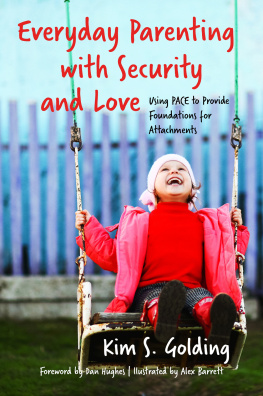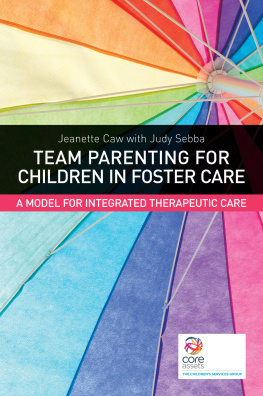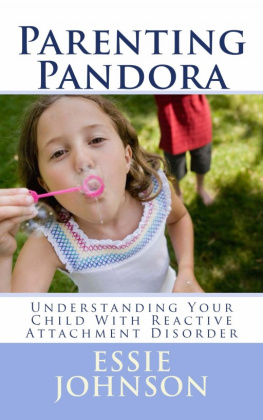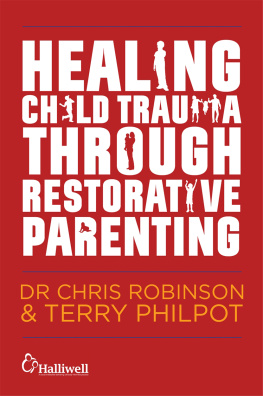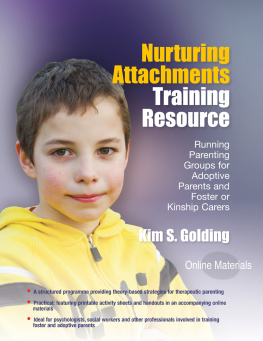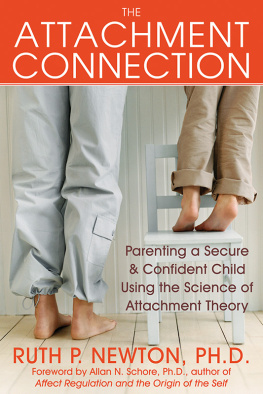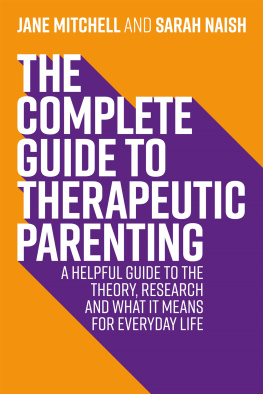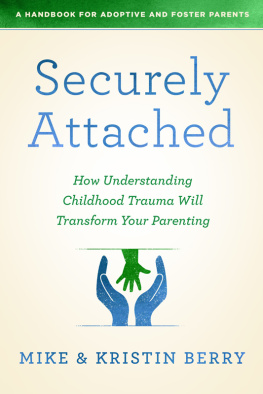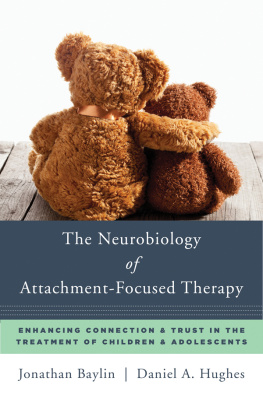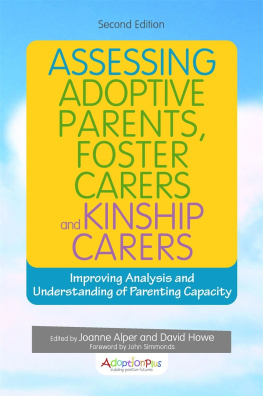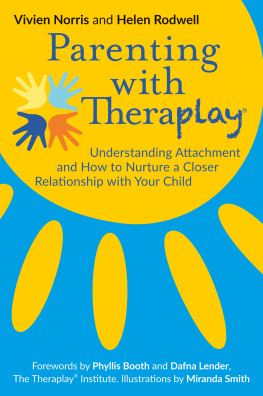
EVERYDAY
PARENTING WITH
SECURITY AND LOVE
Using PACE to Provide Foundations for Attachment
KIM S. GOLDING
Illustrated by ALEX BARRETT
Foreword by DAN HUGHES

Jessica Kingsley Publishers
London and Philadelphia
CONTENTS
FOREWORD
Dan Hughes
As we come to understand the complex process of human development, it is increasingly clear that for optimal development children need to forge strong relationships with their caregivers, and from there, meaningful and important relationships with other members of the family, as well as friends, teachers, mentors and many others over the course of their lifetime. Along with this understanding has come the awareness that for children to develop such relationships they need to have experiences that go beyond being given instructions, reinforcements and role models. They need to have experiences that are characteristic of a good relationship. Too often we stress that the child needs a relationship with their caregivers, teachers and counsellors without attending enough to what exactly defines those relationships as well as how to attain these qualities. In this important book, Dr Kim Golding provides us with the guidance needed to understand and develop relationships with children and youth who desperately need them in order to have success and joy in their lives.
Some of our best insights into what is a good parentchild relationship come from relationships that are characterized by trauma and deprivation. Children who have experienced abuse and neglect from their primary caregivers manifest pervasive problems, placing them at risk in all areas of their neurobiological, psychological, emotional, cognitive and social development. We have increasingly realized that their developmental problems are more to do with the failures and violations of trust in their relationships with those who are meant to provide them with good care than with the specific acts of abuse. When children experience relationships that are designed to provide safety but instead provide terror and shame, these children do not learn how to relate with others in ways that are necessary for their development. Their future ability to engage in healthy relationships is compromised, often in profound ways.
Dr Golding has provided us with a comprehensive understanding of parentchild relationships, how they develop and how they are repaired and maintained. She integrates the latest theories and research, ranging from the neurobiology of attachment and caregiving and psychological studies of attachment, to more general literature regarding emotional, social and cognitive development. While she focuses on providing healing and restorative relationships for children who have been violated in their early relationships with their caregivers, her principles and interventions are certain to be of value for all parents in their relationships with their children.
What characterizes such important relationships in the lives of children? Safety for a start, which is quickly joined in importance with reciprocal engagement between parent and child and the world, through joint interests and intentions. Children need to learn to regulate their strong, complex and often conflicting emotional states. Such learning is attained through parents co-regulating these states within their attuned relationships with their children. Children need to learn to make sense of their inner lives their thoughts, feelings, perceptions, memories and wishes as well as the inner lives of their parents. Such learning is attained through parents joining with them in this mental process of reflecting on and communicating about the meaning of what is happening within and between each of them. Children need to learn to be fully engaged in the present moment, while still being aware of the paths and goals that lead into the future. When walking in relationships with their parents, children are much less likely to lose their way.
I hope that this foreword provides a hint of what lies ahead in this book. It might be best to approach the book by trying to understand the experience of the child and of the parent raising their child, rather than focusing on learning specific interventions though excellent ones are certainly provided. Joining Dr Golding in this journey of understanding and caring for children is likely to be the best way to learn how to successfully engage the children and their parents who we are trying to assist.
Dan Hughes, PhD
INTRODUCTION
One of the hardest parenting jobs anyone can do is to parent a child who fears nurture and comfort. This can be expressed through self-reliance; the child pushes the parent away. Alternatively, the child might be coercively attention-needing, but without any sign of feeling soothed when the parent is available to her. Either way, the parent is left feeling rejected and with a pervasive sense of failure. Even the most resilient of parents can become worn down by this. Without good support, the parent can descend into depression and feel unable to continue caring for the child. Whether the parent has a birth child, or a child born to someone else, the parenting task can lose its joy and become a never-ending task borne out of duty, but with little sense of fulfilment.
This book has been written for parents of children and young people who are experiencing relationship difficulties, and those practitioners supporting these families. Often these difficulties are related to early attachment experience. An important role for parents is to be the attachment figures for their child; parents offer comfort as needed and provide a secure base from which a child can confidently explore. When this secure base is absent, or worse frightening, the child has to find a way of existing without safety and security. The childs development reflects this experience as the nervous system becomes wired for danger and loss. Once learnt, these ways of being do not change easily.
This type of experience is traumatic to young children and is a trauma which stays with them as they are growing up. This trauma has been described by psychologist Bessel van der Kolk (2005) as developmental trauma, and this is the term I will use throughout this book. This is a descriptive term that captures the early experience of the children. The trauma comes from the fear of parents, or the absence of safe caregiving, early in life. Trauma that comes from within the family will have a large impact on the development of the children. This can slow down developing maturity. It also interferes with the development of core capacities such as how to regulate emotions or manage impulses. Strong feelings can emerge but the children do not know how to manage these, or how to turn to parents and close others to help them with this. Similarly, the way children come to develop a sense of self an understanding of who they are can be negatively influenced by this early experience.
For biological parents it can be uncomfortable to think that difficulties have arisen from early attachment experience, but attachment difficulties can arise for many reasons. Parents motivations are usually good and most are committed to being good parents for their children. Sometimes, however, external factors such as illness, or problems stemming from their own childhoods, mean that parents struggle to provide their children with the parenting experience that they need.
Parents who have become parents to an older child through adoption, fostering, kinship care or residential care may experience a less personal impact in exploring the early experience of their children. They are, however, still likely to be affected by an exploration of early experience and how it can impact on attachment and later relationships. Kinship carers especially can face additional complexity when parenting a relatives child.
Next page
